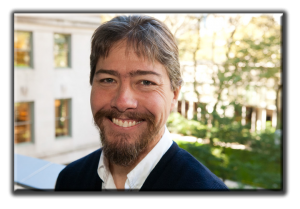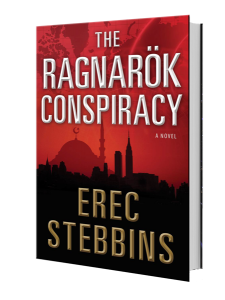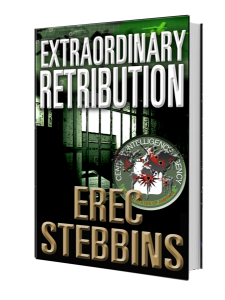Three Questions with…Erec Stebbins
 Erec Stebbins is the author of The Ragnarök Conspiracy (from Seventh Street Books) and Extraordinary Retribution (from Twice Pi Press). He is a biomedical researcher who writes political and global thrillers, science fiction, narrated storybooks, and more. Stebbins was born in the Midwest. His mother worked as a clinical psychologist, and his father was a professor of Romance languages at the University Nebraska in Lincoln. He received a degree in physics from Oberlin College in 1992, and a PhD in biochemistry from Cornell University in 1999. Since 2001, he has run a laboratory studying bacterial pathogens in New York City.
Erec Stebbins is the author of The Ragnarök Conspiracy (from Seventh Street Books) and Extraordinary Retribution (from Twice Pi Press). He is a biomedical researcher who writes political and global thrillers, science fiction, narrated storybooks, and more. Stebbins was born in the Midwest. His mother worked as a clinical psychologist, and his father was a professor of Romance languages at the University Nebraska in Lincoln. He received a degree in physics from Oberlin College in 1992, and a PhD in biochemistry from Cornell University in 1999. Since 2001, he has run a laboratory studying bacterial pathogens in New York City.
Sounds like he’s about one lab accident from either being a superhero or a supervillain, right? But look at that smile. That’s a hero smile. Let’s get to know Erec!
How does a “head of the Laboratory of Structural Microbiology” turn to thriller writing?
It was less turning to thriller writing as allowing myself to reengage with my creative writing activities that had been placed in deep-freeze upon entering graduate school and starting a family. The cryogenics were shut down after 9/11 (which I witnessed from my apartment window). 9/11, like most acts of global violence, was the product of numerous, intersecting historical currents that collided. America was swept up in them from experiencing victimhood on our own soil to fomenting irrational hatred towards billions of mostly innocent peoples of other faiths. We changed as a nation, and at the individual level. My response to my personal journey was a book that helped open the doors to writing again. It just happened to be a thriller (a genre I’ve always enjoyed).
What challenges and opportunities came from writing about such an of-the-moment topic like terrorism?
For me, the only “opportunity” was my personal emotional involvement. To write, for both good and bad, I have to care deeply about the subject of the novel, or 100,000 words just ain’t gonna find their way into the document. The Ragnarök Conspiracy was a novel born from a very emotional response to the 9/11 attacks and what they set in motion (similarly, my thriller Extraordinary Retribution). In fact, it was less opportunity, more necessity, as I had a story that embodied my own ambivalence about our national direction that needed to get out of me.
The challenges were more obvious after the fact (although for a scientist to write a global terrorist thriller required many long hours of background reading). I came to realize that most people like black-and-white narratives dealing with these issues—where the bad guy is clear and gets what’s coming to him—with little room for gray. As Jason Zengerle wrote in “The Beck Supremacy” (for New Republic) a few years back, there is an entire and profitable genre of “conservative” thrillers, the last ten years or so dealing often with terrorism and Islam. Some of the most popular authors in these genres publicly endorse ignoring the Geneva Conventions when dealing with terrorists (or, as they infrequently admit, suspected terrorists).
 Enter The Ragnarök Conspiracy, a book not only with gray areas, but that in one enormous twist “turns the traditional terrorist thriller on its head” (author Allan Leverone). While there were some angry reviews about this calling me all sorts of common labels for the perceived anti-American, mostly there has been silence. It’s challenging to take away the shield of righteousness in this topic and replace it with a mirror. The challenge is even stronger in Extraordinary Retribution, although the pace of that novel seems to have brought in more interest.
Enter The Ragnarök Conspiracy, a book not only with gray areas, but that in one enormous twist “turns the traditional terrorist thriller on its head” (author Allan Leverone). While there were some angry reviews about this calling me all sorts of common labels for the perceived anti-American, mostly there has been silence. It’s challenging to take away the shield of righteousness in this topic and replace it with a mirror. The challenge is even stronger in Extraordinary Retribution, although the pace of that novel seems to have brought in more interest.
What do you and your protagonist John Savas have in common?
Savas is the protagonist in The Ragnarök Conspiracy, but he and the antagonist are just basically incarnate aspects of my own psyche tailored to a thriller. My own personal conflicts about the attack on New York, the global religious, cultural, and economic conflicts, and how we should respond, took shape in my writer’s mind as characters. Always needing to tell a story, a narrative grew around them embodying choices (as I saw them) that people (like myself) in the nation could make for our and the world’s future.
Beyond this metaphysical commonality, Savas is very different from me. He’s a former police officer turned counter-terrorism agent. He’s Greek. He’s a lot tougher than a writer/scientist like me. But he does share the values concerning the need to defend against possible enemies and the need to remain true to our principles as a nation, and when a Muslim CIA agent brings those into conflict he has to decide which road he’ll take. His choices ultimately determine the fate of the novel (and, since it’s a global thriller, the fate of the world, of course).
—
See? I told you I was betting on the smile.
Learn more about Erec at his website, where you can watch book trailers for both books. Get hooked: read the first chapter of The Ragnarök Conspiracy here.